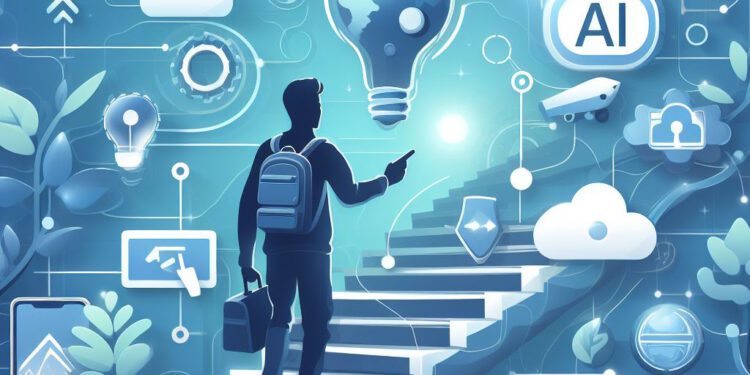A new report released by the World Economic Forum has revealed a concerning perspective on the future of employment and the increasing impact of artificial intelligence in our work environments: 41% of global employers anticipate job reductions as AI begins to automate tasks on a large scale over the next ten years. The findings emphasize a transition that many previously doubted, with data from numerous international firms indicating a future where individuals may need to reassess their worth and skills. Nevertheless, 77% of employers express a commitment to reskilling and upskilling their workforce, aiming for a productive collaboration between humans and technology.
AI will transform the way we work according to new global survey
“As we approach 2025, the work environment is rapidly changing. Revolutionary advancements, especially in generative AI, are altering industries and tasks across various sectors,” stated Saadia Zahidi, managing director of the World Economic Forum, in the report.
“However, these technological innovations are coinciding with a wider range of challenges, including economic instability, geopolitical shifts, environmental issues, and changing societal expectations,” they noted. There is no doubt about the challenges that lie ahead, but this recent research aims to bridge the gap and guide employees toward a more knowledgeable and equipped future. Within the next five years, workers will find that nearly 40% of their existing skills may become obsolete or significantly altered, according to the study. Those who embrace AI, instead of resisting it, will be better positioned for success in the future. Skills related to technology, innovative problem-solving, and a strong commitment to continuous learning will be essential.
Upskilling is critical for securing future careers
In the coming years, businesses will contend with increasing skills gaps, as 63% of employers foresee this becoming a significant hurdle between 2025 and 2030. To tackle this, 85% of employers are focusing on upskilling, while 40% are considering workforce reductions due to skill obsolescence, as reported by the World Economic Forum.
Strategies will vary based on each company’s specific objectives and operational setup, and there won’t be a one-size-fits-all approach. While reskilling will be a priority, businesses must first identify the skills they need most urgently. A well-defined skills framework can assist organizations in this process and facilitate a smooth transition.
Effective communication is also vital as AI transforms the workplace. Establishing an open channel regarding AI usage fosters trust and clarifies the value AI can bring. Furthermore, critical thinking will remain indispensable—AI has its limitations, and employees should voice concerns when it hampers progress.
Generative AI particularly presents a multitude of opportunities, allowing us to move away from labor-intensive and repetitive duties. It exemplifies one of the many advantages of the upcoming era. From writing emails to managing tedious data collection, AI is set to simplify or even eliminate such responsibilities, enabling us to concentrate on more significant work. As a result, knowledge workers may increasingly find themselves spending more time in creative and leadership positions.
Which positions will be most impacted by AI integration?
The rise of AI automation has fueled anxiety regarding significant layoffs, with U.S. hiring announcements reaching their lowest levels since 2015. This trend is expected to persist into the next year, particularly in fields such as transportation, manufacturing, and education. A report from Challenger, Gray and Christmas in September revealed that transportation companies announced 25,263 job cuts, the education sector experienced a 220% rise in layoffs compared to the previous year, and manufacturing recorded 19,794 job losses in 2024. In the near term, blue-collar positions are likely to face the brunt of AI automation. Nevertheless, even jobs perceived as secure today may not be safe.
Positions deemed essential and irreplaceable are expected to increase in value. The World Economic Forum report indicates that by 2030, more than half of employers (52%) plan to raise wage allocations for remaining positions, reflecting a heightened demand for skilled labor over the next decade.
It’s not just top executives who are grappling with how to navigate the upcoming phase of AI integration. Employees are also reexamining their roles, functions, and responsibilities, questioning the significance of their contributions in an era of technological advancement. A 2024 study from the New York Federal Reserve’s Liberty Street Economics blog revealed that 4 in 10 Americans are concerned generative AI may reduce job availability.
Could AI diminish the necessity for human labor?
Some executives are wholly dismissing the concept of AI-human collaboration and are instead placing complete confidence in AI. Last month, Klarna CEO Sebastian Siemiatkowski disclosed that he hadn’t brought on new hires in a year due to the company’s reliance on AI, implying that all internal functions could be fulfilled by machines. This week, he reinforced his position on X, asserting that even his own job could ultimately become unnecessary.
Artificial intelligence carries both the potential for progress and the risk of challenges, with numerous uncertainties still in play. What remains clear is that those who adapt and collaborate with AI will be better equipped for the future. Conversely, for others, the journey may be significantly more challenging, and in dire scenarios, millions might find themselves rethinking their career paths entirely.


